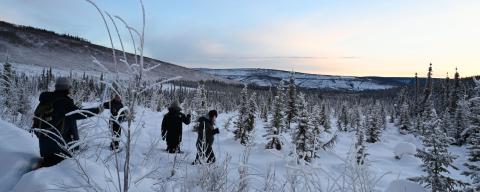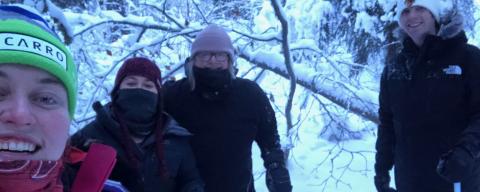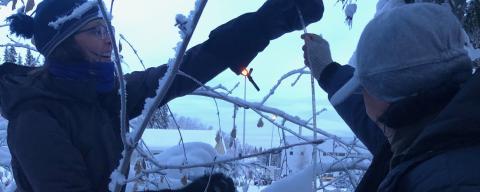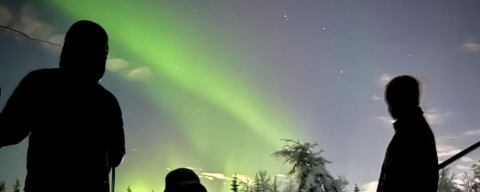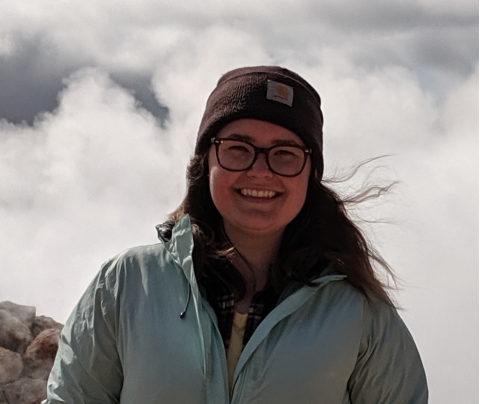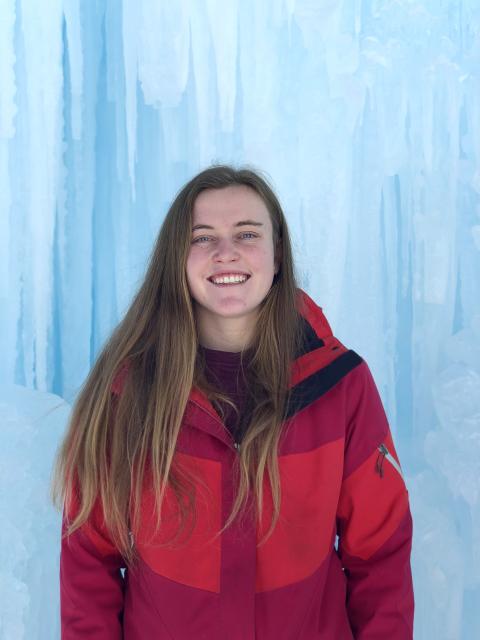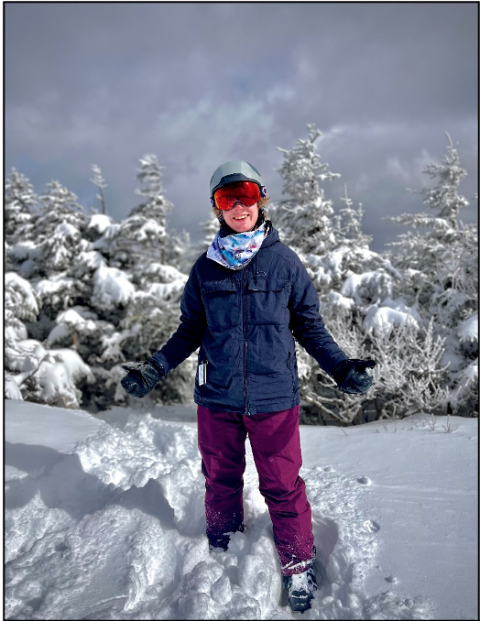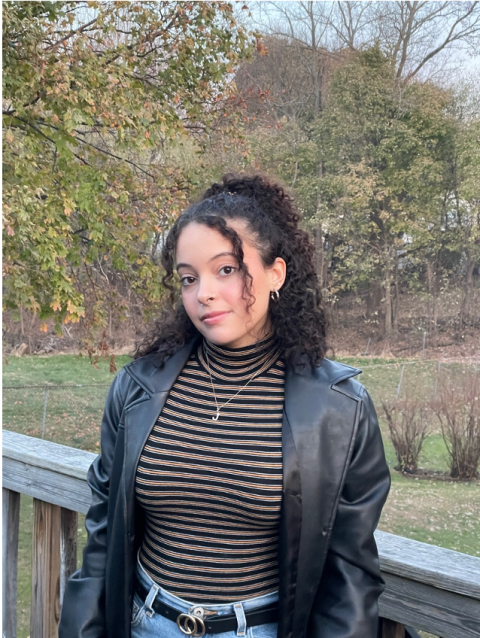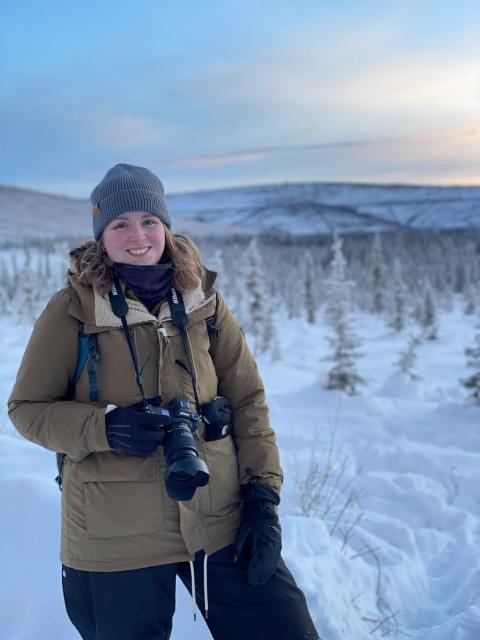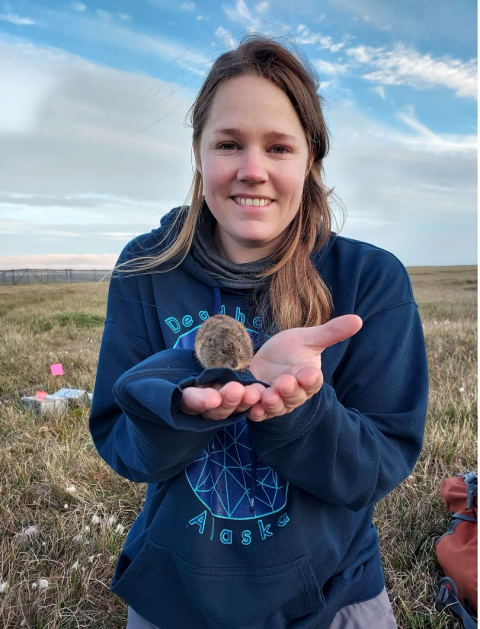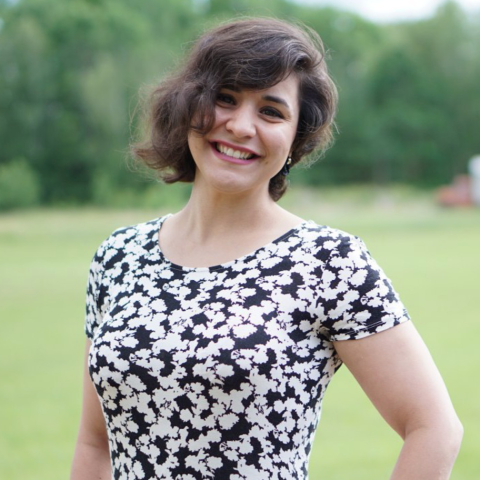CARPE Cohort I
Emma Burkett is a Ph.D. student in the Natural Resources and Earth Systems Science (NRESS) program in the Earth Sciences department at the University of New Hampshire. Her research is centered on decoding indications of imminent eruptions and magma evolution beneath Aleutian arc volcanoes. Due to the inaccessibility of direct observations from magma chambers, Emma uses interdisciplinary work blending remotely sensed observations, ground-truthed data from volcanic products, and inferences gained through thermodynamic and geochemical modeling to tackle the challenging relationship between surficial manifestations of potential eruptions and the magma assembly process.
Emma also enjoys merging hobbies such as knitting, crocheting, cross-stitching, and embroidery with science communication.
Cheristy (“Cherry”) grew up near Salt Lake City, Utah. She is currently a PhD student in Earth and Environmental Science at the University of New Hampshire in the Trace Gas Biogeochemistry Lab (PI: Dr. Ruth Varner). Her research focuses on linking vertical methane and carbon dioxide emissions to lateral carbon transport and transformation in the Arctic. Cheristy’s ultimate goal is to conduct research with local communities to help inform local and global policy decisions.
Cheristy received my BA in Environmental Science with Distinction at Colorado College and was a member of the Watershed Biogeochemistry Lab (PI: Dr. Rebecca Barnes) where she discovered my passion for investigating landscape scale processes.
When not in the field or the lab, you can find her hiking, biking, or skiing in the mountains
Tim is a Ph.D. student in Natural Resources and Earth Systems Sciences. Tim’s research takes inspiration from his time on the snow as a collegiate skiing athlete and focuses on Remote Sensing and UAS technology applications to address environmental and natural resource inquires in the Arctic and cold regions. Tim began studying Remote Sensing during his time at West Virginia University where, as a NASA WV Space Grant Consortium Fellow, he conducted pioneering research on the intersection of UAS technology and cool-climate viticulture. Presently, after being named a West Virginia Science & Technology Policy Fellow and contributing to several papers on Russian geopolitics, Tim has opened his studies to include evaluation of the geopolitical dynamics of science diplomacy and science policy in the Arctic.
Josibel “Jojo” Pardo is a Master’s student in Earth Sciences: Geochemical Systems working with Dr. Ruth Varner. She recently graduated from the University of New Hampshire with a Bachelor’s degree in Environmental Science: Ecosystems and was motivated to continue her education. Her research will focus on the relationship between sediment methane production and methane emissions in Arctic lakes in Sweden. When not doing work, you can find her tucked in bed with a book or hanging out with friends.
Megan Verfaillie is a Ph.D. student in Civil & Environmental Engineering at the University of New Hampshire (UNH) where she received a fellowship from the NSF-sponsored Convergent Arctic Research Perspectives and Education program. Megan’s master’s research at UNH was funded by the Arctic Domain Awareness Center in partnership with the UNH Center for Spills and Environmental Hazards to study oil spill modeling for improved response to arctic maritime spills. Her current research interests include cold region extreme weather disasters, snow hydrology, and remote sensing/unmanned aerial systems. Her research is motivated by the desire to advance data collection techniques and modeling tools to fill data gaps, inform decision making, and reduce risks. Megan often spends her weekends tending to her houseplants, playing with her cat, or spending time outdoors behind the lens of her camera.
Information coming soon.
Jess is currently a PhD candidate in the Natural Resources and Earth Systems Sciences (NRESS) program at the University of New Hampshire. Her research focuses on the effects of climate change on wildlife populations with a focus on northern ecosystems. Her dissertation combines field studies on voles and lemmings in northern Alaska with laboratory analysis of stress hormone levels to increase our understanding of the mechanisms driving Arctic rodent populations. This research is also part of a multi-university collaborative group (affectionately called ‘Team Vole’) that examines the impacts of current and future rodent herbivore populations on tundra carbon and nutrient cycling. At UNH Jess is also part of the first cohort of the Convergent Arctic Research Perspectives and Education (CARPE) graduate research traineeship. Besides walking the tundra looking for lemmings, Jess can be found bike and skijoring with her dogs, surfing and most recently, building an outdoor catio (think patio) so her cat can also safely experience the great outdoors.
Mahsa Moradi (participated in 2022)
CARPE Cohort 2
Elham is currently a Ph.D. student in geotechnical engineering at UNH where she received a fellowship from College of Engineering and Physical Sciences (CEPS). Her current focus is on an eager multidisciplinary project, including a theory of planned behavior to investigate engineers’ intentions-actions in the design process of coastal infrastructure design, their risk alignment, and engineering view of local community engagement. She is also involved in a project concentrating on system dynamic models for climate change impacts on infrastructure resilience in the Arctic. She lives in a friendly, peaceful, diverse neighborhood in Dover and enjoys socializing with people from different countries. Along with her research, she enjoys listening to podcasts and music and plays piano in her leisure time.

Sam Bratsman is a PhD student studying Arctic microbial ecology. He is particularly interested in using genomic data to learn how microbial communities respond to disturbance across the Arctic, and how this response may exacerbate climate change. During his Master’s at Brigham Young University, he studied nutrient thresholds of freshwater algal blooms and organic carbon degradation in Arctic stream networks. Sam also enjoys birding and nature photography.
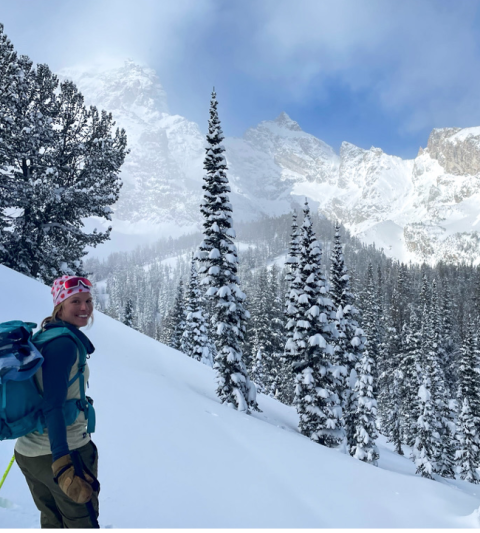
Julia is an M.S. candidate in Hydrology in the Earth Sciences Department at the University of New Hampshire, working with Alix Contosta and Liz Burakowski to study changing winters and their impact on springtime vegetation ecology and hydrology in the Teton Range in WY. Her work uses both ground and remote sensing snow and phenology data, as well as soil moisture and streamflow data, to explore the time between snowmelt and vegetation green-up, known as the vernal window. She is passionate about research that contributes to tangible community understanding of climate change, in hopes that understanding inspires climate action. Julia loves doing and teaching science in the field—especially in the cold and snow—because of the wonder a day outdoors can impart. When not doing science, you can find her baking brownies and bread to bring on running, hiking, or backcountry skiing trips in the Tetons
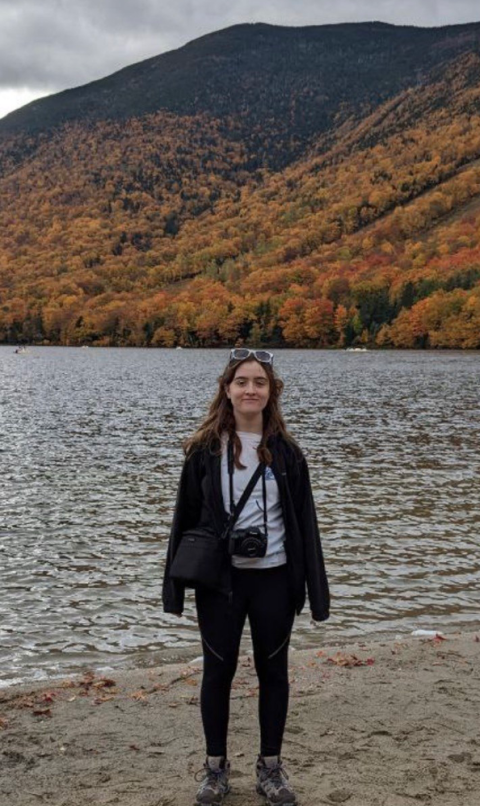
Theresa Reynolds is a first year Earth Sciences: Geochemical Systems Specialization master’s student working with Ruth Varner. She studies how methane emissions are changing in the Arctic. Specifically, Theresa is interested in understanding how the isotopic composition of methane in Arctic lakes varies with different sediment types. In her free time, she likes to go on hikes in the mountains and take pictures of the beautiful scenery.

Else is a first-year PhD student in Natural Resources and Earth System Sciences working with Stuart Grandy and Jessica Ernakovich. Her research focuses on refining global climate models to better predict changing carbon dynamics in the Arctic permafrost. Prior to graduate school, she led wilderness trail crews, apprenticed on an organic vegetable farm, and taught physics to high school and undergraduate student
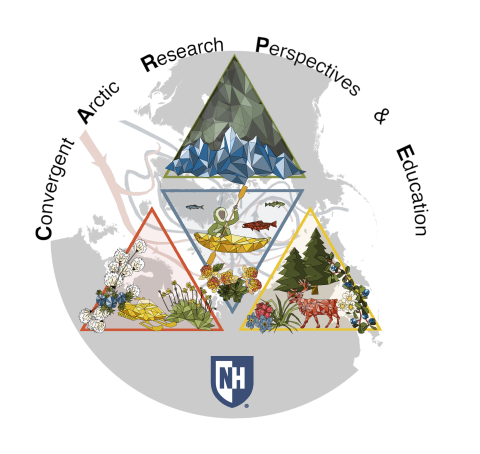
Helen Sears is an M.S. Student in Earth Sciences at New Hampshire University. Her work focuses specifically on aerial lake vegetation mapping in Norther Sweden and their connection to methane fluxes. She enjoys exploring the geology of abandoned mines in the New England area and playing rugby.
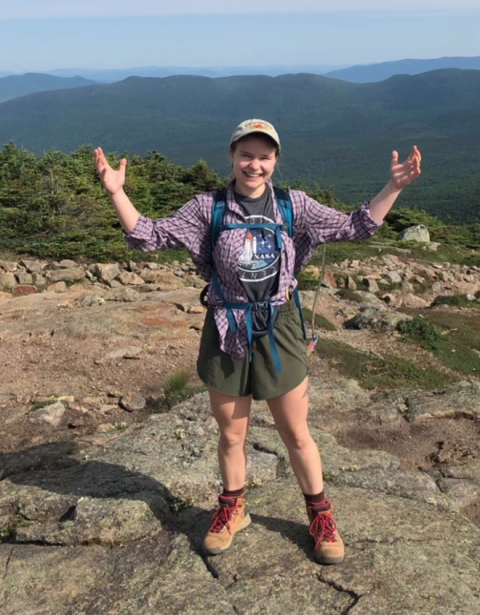
Annelise Waling is a 2nd year hydrology master’s student at the University of New Hampshire. Her thesis involves comparing climate models to better represent atmospheric rivers and other synoptic-scale storms around Greenland. Her broader interests include studying the changing mass balance of Greenland and the impacts of climate change on the Inuit living there. In addition to this, Annelise is interested in helping local New England communities in their climate adaption and mitigation plans. In her free time, Annelise enjoys baking, rock climbing, and embroidery.
CARPE Cohort 3
CARPE Cohort 4
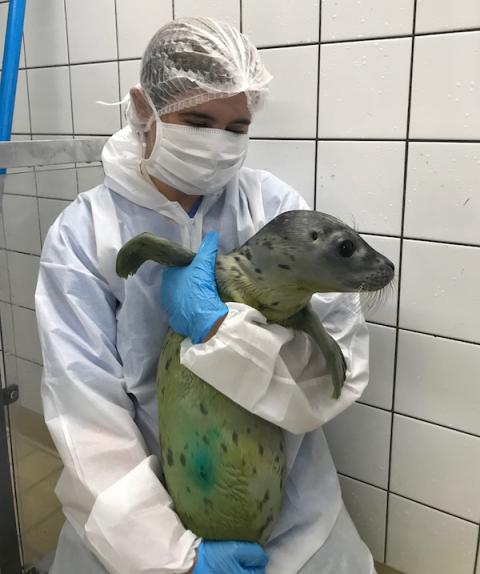
Daryll is a Ph.D. student in Oceanography at the University of New Hampshire (UNH) working in affiliation with UNH’s Center for Acoustics Research and Education (CARE). Her general research interests include bioacoustics, animal behavior, and movement ecology. Daryll’s doctoral research focuses on using acoustic tools to understand patterns in the distribution of baleen whale species in the western North Atlantic. She combines acoustic occurrence data with oceanographic data to develop species distribution models and provide new insights into habitat suitability, inter-species variation, and patterns in population density.
Daryll also enjoys birdwatching, wildlife photography, tending to her many indoor plants, and spending time with her dog, Zoe.

Claudia Guillot-Wallace is a master’s student in the Earth Sciences department at UNH studying strontium isotope geochemistry. Her research investigates altering hydrologic flow paths as a response to thawing permafrost in Arctic Sweden. Claudia is passionate about climate science and resource management and is grateful to be using geochemical tools to answer important questions about our changing planet. When she’s not in the lab or in the field, she is listening to music, baking, or doing ceramics.

Rachel is a marine biology MS student at UNH with SeaBABEL, studying bearded seal breeding phenology and climate change in the Alaskan Arctic. Her research interests include investigating ecological shifts in the Anthropocene and marine mammal bioacoustics (both as a tool and because it is awe inspiring to listen to and try to understand these animals). Rachel is also passionate about science communication. When she is not at the lab (or working in a coffeeshop) she can likely be found at the beach, walking in the woods, skiing, or curled up with a good book.
